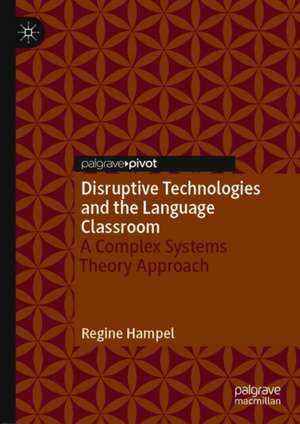Disruptive Technologies and the Language Classroom: A Complex Systems Theory Approach
Autor Regine Hampelen Limba Engleză Hardback – 14 noi 2019
Preț: 452.25 lei
Nou
Puncte Express: 678
Preț estimativ în valută:
86.55€ • 93.98$ • 72.70£
86.55€ • 93.98$ • 72.70£
Carte tipărită la comandă
Livrare economică 23 aprilie-07 mai
Preluare comenzi: 021 569.72.76
Specificații
ISBN-13: 9783030313678
ISBN-10: 3030313670
Pagini: 156
Ilustrații: XVII, 156 p. 3 illus., 2 illus. in color.
Dimensiuni: 148 x 210 mm
Greutate: 0.36 kg
Ediția:1st ed. 2019
Editura: Springer International Publishing
Colecția Palgrave Pivot
Locul publicării:Cham, Switzerland
ISBN-10: 3030313670
Pagini: 156
Ilustrații: XVII, 156 p. 3 illus., 2 illus. in color.
Dimensiuni: 148 x 210 mm
Greutate: 0.36 kg
Ediția:1st ed. 2019
Editura: Springer International Publishing
Colecția Palgrave Pivot
Locul publicării:Cham, Switzerland
Cuprins
Chapter 1: Introduction.- Chapter 2: Theoretical Framework.- Chapter 3: Human Meaning-Making: Communication Tools, Modes and Epistemic Practices.- Chapter 4: Computer-Mediated Communication in the Language Classroom: Disruptions in Learning and Teaching.- Chapter 5: What If?.- Chapter 6: Implications for Teaching and for Research.- Chapter 7: Conclusion.
Notă biografică
Regine Hampel is Professor of Open and Distance Language Learning at the Open University, UK.
Textul de pe ultima copertă
“This book captures the multi-faceted nature of new technologies and their potential for language use and language learning and the transformative changes they have introduced within language classrooms. With theoretically-grounded rigour, Regine Hampel provides a comprehensive, readable and thought-provoking account of disruptive technologies, shedding light on the theoretical and practical implications that come with new tools and new practices for language learning.”
-- Cynthia J. Massey, Professor of Applied Linguistics, Massey University, New Zealand.
“Digital technologies are changing our lives, and in this exciting book we see how they are shifting our language learning and teaching practices. By combining a complex systems theory perspective with sociocultural understandings, Regine Hampel offers rich ways to understand what is happening and opens up important questions for pedagogy, theory, and research.” -- Lynne Cameron, Professor Emerita, Open University, UK.
Although new technologies are embedded in students’ lives today, there is often an assumption that their use is transparent, inconsequential, or a distraction. This book combines complex systems theory with sociocultural theory and the multimodal theory of communication, providing an innovative theoretical framework to examine how communication and meaning-making in the language classroom have developed over time, how technology impacts on meaning-making, and what the implications are for learners, teachers, institutions and policy makers. Recent studies provide evidence for the disruptive effect of technology which has resulted in a phase shift that is reshaping language education by creating new interaction patterns, allowing for multimodal communication, and introducing real-world communication into the classroom. The book proposes ways of responding to this shift before concluding that the new technologies are radically transforming the way welearn. It is likely to appeal to a range of readers, including students, academics, teachers and policy-makers.
Regine Hampel is Professor of Open and Distance Language Learning at the Open University, UK.
“Digital technologies are changing our lives, and in this exciting book we see how they are shifting our language learning and teaching practices. By combining a complex systems theory perspective with sociocultural understandings, Regine Hampel offers rich ways to understand what is happening and opens up important questions for pedagogy, theory, and research.” -- Lynne Cameron, Professor Emerita, Open University, UK.
Although new technologies are embedded in students’ lives today, there is often an assumption that their use is transparent, inconsequential, or a distraction. This book combines complex systems theory with sociocultural theory and the multimodal theory of communication, providing an innovative theoretical framework to examine how communication and meaning-making in the language classroom have developed over time, how technology impacts on meaning-making, and what the implications are for learners, teachers, institutions and policy makers. Recent studies provide evidence for the disruptive effect of technology which has resulted in a phase shift that is reshaping language education by creating new interaction patterns, allowing for multimodal communication, and introducing real-world communication into the classroom. The book proposes ways of responding to this shift before concluding that the new technologies are radically transforming the way welearn. It is likely to appeal to a range of readers, including students, academics, teachers and policy-makers.
Regine Hampel is Professor of Open and Distance Language Learning at the Open University, UK.
Caracteristici
Deals with the disrupting effects of new technologies on language learning and teaching with a view to improving practice Demonstrates how complex systems theory can be used in conjunction with other theories to elucidate language learning via technology Examines changes in human meaning-making practices over time, culminating in the advances in digital technologies which are changing education today
